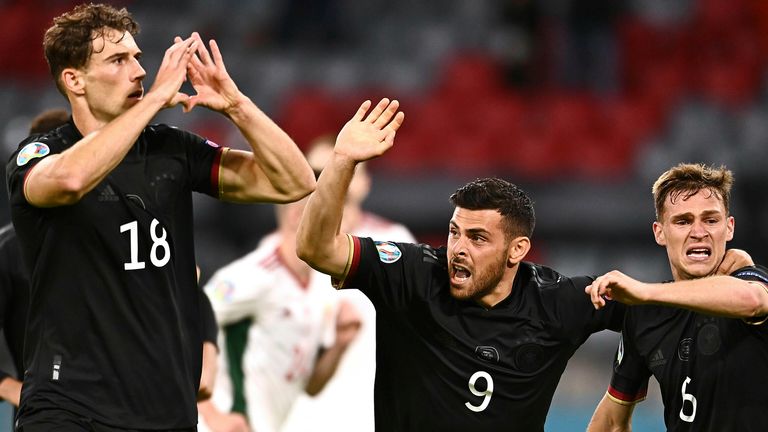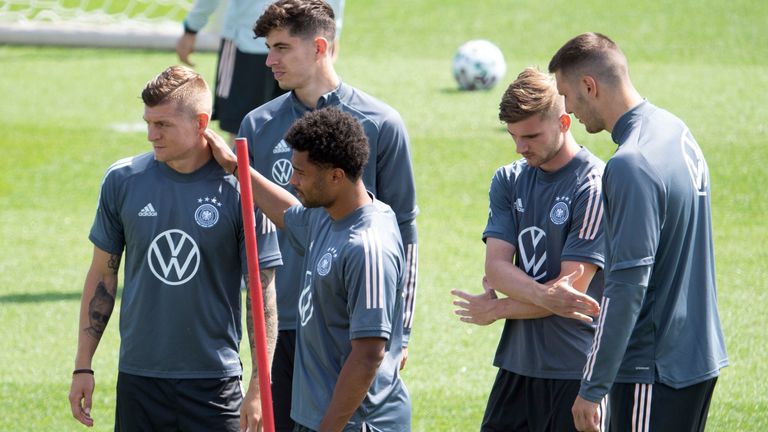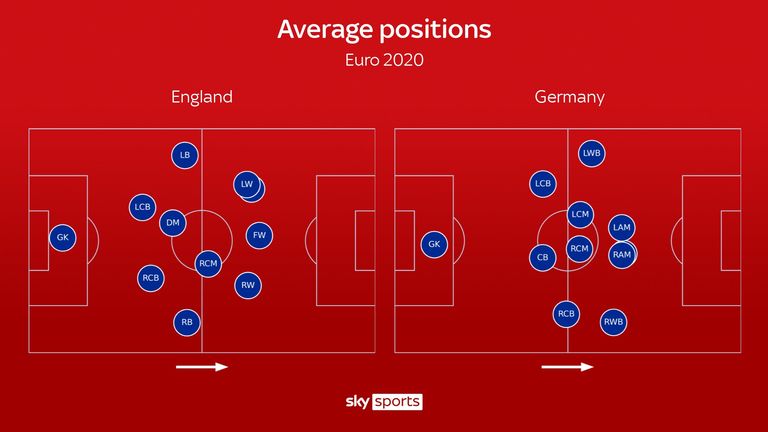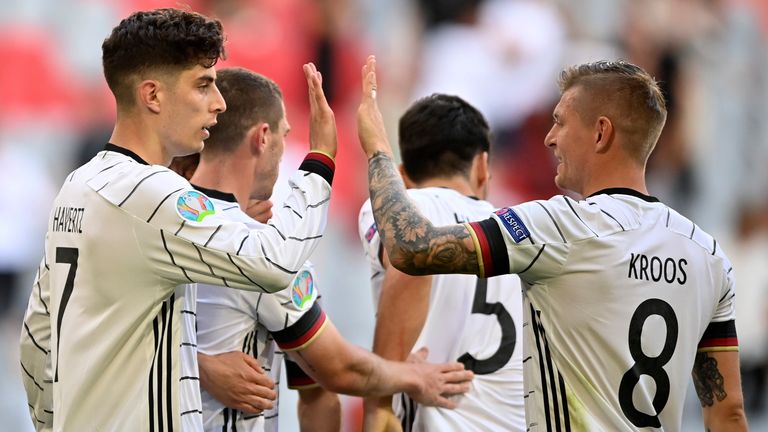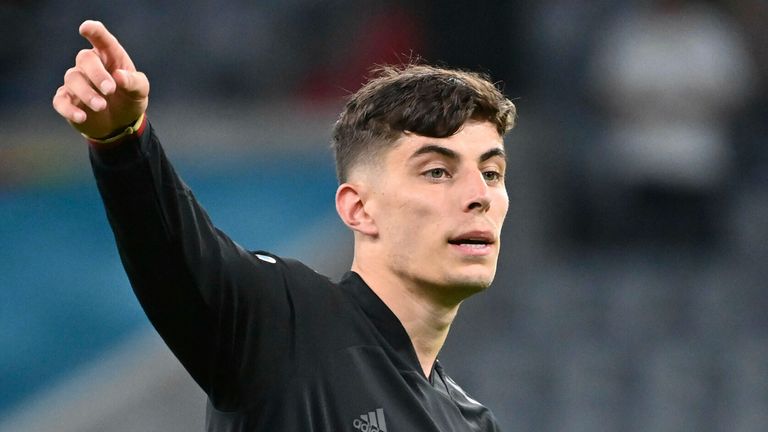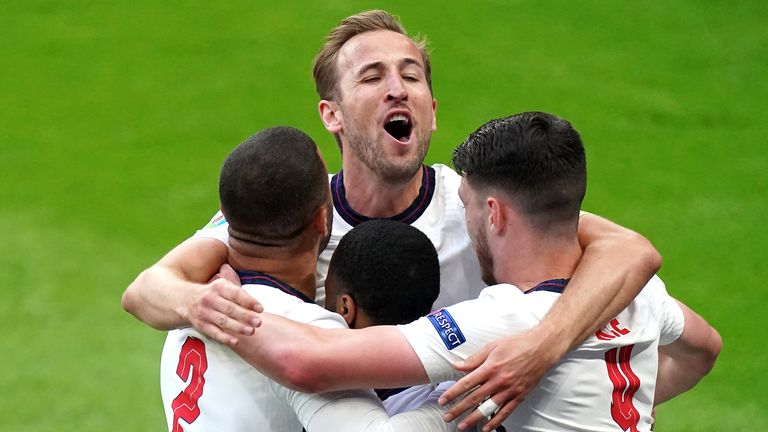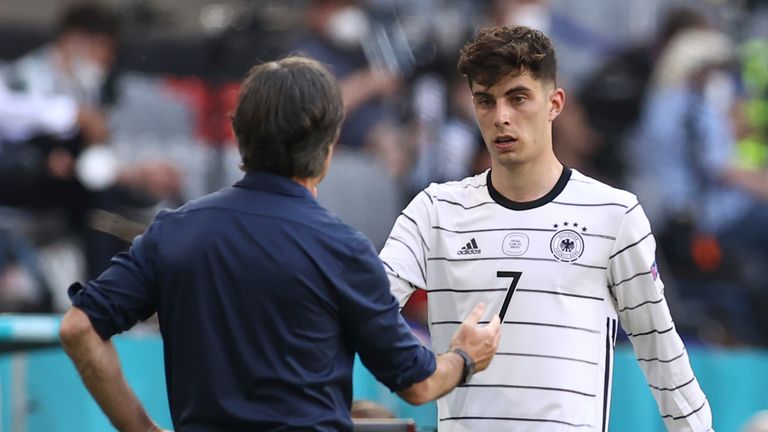Germany's strengths and weaknesses analysed ahead of Euro 2020 last-16 meeting with England
Rob Dorsett analyses the strengths and weaknesses of Germany as England prepare to face their old foe in the last 16 of Euro 2020.
Tuesday 29 June 2021 06:40, UK
England are favourites to beat Germany in the last 16 and end the hoodoo of having never managed a knockout victory over their greatest rivals in a major tournament since 1966.
England are ranked higher in the FIFA rankings (fourth vs 12th); they're in better form than Germany (eight wins and a draw compared with four wins, two draws and three defeats); and Southgate's team will be backed by the vast majority of the 45,000 fans inside Wembley.
Germany have won one, drawn one and lost one in finishing second in Group F, and the tournament statistics would tell you they have been far from consistent.
Rob Dorsett analyses their strengths and weaknesses as they prepare to once again meet their old foe...
- England's route through Euro 2020
- Germany banned from training at Wembley
- Euro 2020 fixtures and schedule | Euro 2020 gossip column
Formation
Germany have consistently played a 3-4-2-1 formation so far in the Euros, though there is an increasing clamour among the fans to return to the back four they have used so successfully in the past.
While the formation has been consistent, performances have not. A stand-out win against Portugal has been book-ended by two poor performances against France and Hungary.
Joachim Low is still searching for his best formula in his final tournament as boss - defeat to England would mean an end to his 17-year tenure in charge of the 2014 World Cup winners.
Four years ago, Gareth Southgate first used a three-man defence as England manager - against Germany. He now has a decision to make about whether he matches up to Germany and does so again.
In the group stages, he has stuck with a 4-2-3-1 formation which allows him to play two holding midfield players without sacrificing too much creative talent. England have trained with both a back three and a back four in recent days, and throughout the tournament.
Passing
This is where the Germans have been outstanding - they've kept the ball better than any other team in the tournament, with over 90 per cent passing success. Only Spain have totalled more successful passes.
This means two things from an England perspective - they will have to be patient at Wembley on Tuesday, and may not be able to dominate possession as much as they would like. It also means Southgate's men must keep the ball well when they have it, because once lost, it will prove very difficult to win back.
Both England and Germany have employed the high press to good effect in the tournament so far - the two sides rank alongside each other in terms of winning possession in the final third (Germany are 5th overall with 19, England 7th with 17).
Attack
This is an area where Germany have been much more impressive than England.
Low's side have averaged two goals per game so far, whereas Southgate's team have managed just two goals across their three games. England are the lowest scorers to make it through to the last 16, and have mustered just five shots on target in four-and-a-half hours of football. That's a damning statistic and shows just how cautious England have been.
By contrast, Germany are in the top five of all teams in the Euros for goals scored and shots converted, and they're sixth overall for the number of shots on target.
It's also clear that there are significant differences between England and Germany in terms of where the attacks come from. Germany have had 49 crosses in open play (not including free kicks and corners) in three matches, compared with England who have had just 17.
This suggests Germany's danger comes from wide positions, whereas England so far have been very narrow in the way they've attacked - surprising when you consider the wealth of wide attacking talent at Southgate's disposal.
Pace is also a key factor, and if - as expected - Germany play Serge Gnabry and Leroy Sane, they will have speed to burn up front. That makes the inclusion of the rapid Kyle Walker in a back four - or a back three - much more likely, and much more important.
Add the intelligence of Kai Havertz, who drops off defenders and finds space between the defensive lines, and this could be another area of concern for England. If Havertz draws out England's centre backs, Gnabry and Sane can exploit the space in behind.
Young attackers out of form?
Nevertheless, the goals so far haven't come from Germany's biggest names - with the exception of Havertz. Gnabry has only scored once for club or country in a competitive game since March. Compare that to the previous season, where he formed one of the most deadly partnerships in Europe, with Robert Lewandowski, to help Bayern Munich win the Champions League.
Sane was PFA Young Player of the Year for Man City in 2018, but he has yet to shine at these Euros. Low used him as a late substitute in the first two group games, and even though he got a full 90 minutes against Hungary on Wednesday night, he is yet to impress.
Likewise Chelsea's Timo Werner. He's been out of favour so far, and has only played 40 minutes of football for Germany in this tournament.
Defence
England have proved themselves much stronger than Germany in repelling attacks.
Renowned for their miserliness at the back, the German's have been uncharacteristically lax defensively. They have yet to keep a clean sheet, compared with England, who have yet to concede a goal in three matches (and who only conceded three shots on target in the whole of the group stages).
Germany have faced 20 shots in their three games - the fourth lowest of any team in the tournament. But they've conceded five goals so far, so that's one goal for every four shots they've faced.
That suggests that when teams attack Germany, they are not as impregnable as they have been in the past. Players with huge reputations - goalkeeper Manuel Neuer and Hummels - who are now 35 and 32 years old respectively, have been said by some pundits to be beyond the very peak of their powers.
Whether Southgate acknowledges those statistics and sets his England team out to be more offensive than he has been so far in the Euros, remains to be seen.
Key Players
Apart from Neuer in goal only Toni Kroos, Josh Kimmich and Antonio Rudiger have been ever-present in the tournament so far. That hints at how Low has been searching for a winning formula.
Kai Havertz
The statistics show the Chelsea forward has been Germany's biggest threat by far. He's managed nine shots in three matches - more than double the tally of any other German forward. He's also had the most touches in an opponents' box (17), way ahead of Gnabry and Thomas Muller. At the end of the group stages, Havertz was third overall in the expected goals table, behind Cristiano Ronaldo and Alvaro Morata.
Toni Kroos
He is a passing machine. Kroos has completed 280 passes - more than one per minute he's been on the pitch - and almost 10 per cent more than any other player from any other nation in the tournament before the knockout stages. The Real Madrid midfielder is also in the top four players for tackles won in the tournament. He's won 10 so far, in three matches. How England cope with him could be key. If they stop Kroos from dictating play in the midfield, they can then take the game to Germany.
Mats Hummels
The 32-year-old defender is hugely experienced with 75 international caps, and hugely important to this German side. He's also very dangerous at both ends of the field, as borne out by the stats. He is second in the German standings for attempts on goal (five) and the team's leader in terms of interceptions (nine) - that's almost double any other German player. Playing in the sweeper role, he is also key to Die Mannschaft possession, dictating the play and linking up so effectively with Kroos. The personal duel between Hummels and Harry Kane could be another vital factor in deciding the game's outcome.
Leon Goretzka
There is an increasing clamour among Germany supporters for the Bayern Munich midfielder to be included in the starting eleven at Wembley - not least because without his late equaliser against Hungary on Wednesday, Germany would have suffered the ignominy of being knocked out in the group stages of two successive major tournaments. Goretzka came on for the last 20 minutes against Portugal, and the last 35 mins against Hungary - both times replacing Manchester City's Ilkay Gundogan. He is now pushing for a first tournament start against England.
Thomas Muller
The Germany legend - like Hummels - was coaxed back into the national squad for this tournament by Low, almost two years after he was last selected for his country. With over 100 caps to his name, his very presence is a huge factor for the rest of the team. He is clearly not fully match fit, and was rested for the first half against Hungary as he continues to nurse a knee problem. But the 31-year-old is still a key voice in this German side. He is Joachim Low's on-field coach, in very much the same way that Jordan Henderson is for England, and is almost certain to start at Wembley.
"This is the game of our lives" | Gary Neville's England vs Germany verdict | Tactics, Sterling's importance, and lessons from Euro 96
Gary Neville joins Peter Smith ahead of England vs Germany to talk tactics ahead of the big last-16 tie at Euro 2020 at Wembley.
The Sky Sports pundit explains how playing a back three can help England nullify Germany's wing-backs but also give the Three Lions' attack the chance to "cause massive problems" at the other end.
Neville also discusses Raheem Sterling's leading role in the team, what the current generation can learn from Euro 96 heartbreak against Germany, and why he believes England can edge past their old rivals…
"It's going to penalties!" | Defence analysed, Henderson's role, why Saka has to start | Jamie Carragher's England vs Germany verdict
Is it going to happen again? Jamie Carragher is convinced England vs Germany is heading to penalties when they meet in the last-16 of Euro 2020 at Wembley on Tuesday.
The Sky Sports pundit joined Peter Smith to examine the clash and explain why these two evenly matched sides may end up only being separated by spot-kicks.
Carragher also dissects England's defence, which has kept three clean sheets, explains the factors Gareth Southgate will be weighing up when he decides to pick Jordan Henderson or not, and discusses whether Mason Mount or Ben Chilwell could still play a role, despite isolating until Monday.
